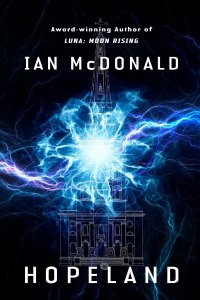Paul Di Filippo Reviews Hopeland by Ian McDonald
 Hopeland, Ian McDonald (Tor 978-0765375551, hardcover, 512pp, $30.99) February 2023
Hopeland, Ian McDonald (Tor 978-0765375551, hardcover, 512pp, $30.99) February 2023
Try to imagine some improbable authorial workmate pairings. Tanith Lee and Andre Norton? Dan Brown and Christopher Priest? Robert Sheckley and M. John Harrison? It’s a given that such mismatches would come to naught. But a similar yoking of semi-antithetical writers—at least in spirit—is at play in Ian McDonald’s big new exciting and tender saga, Hopeland. It’s a fusion that works magnificently, however: John Crowley crossed with Neal Stephenson. Utilizing your powers of cognitive dissonance, think Little, Big meets Termination Shock, and you’ll have some vague notion of the pleasures in store: fabulist love story (“Love falls from the summer sky” is the opening line) blended with hard-edged near-future speculative roadmap.
We open amidst the 2011 riots in London. A hapless fellow—something of an Ichabod Crane type, in both appearance and nature—is wandering cluelessly through the dangerous streets. His name is Amon Brightbourne. He is a musician looking for the agreed-upon location of his next gig. His music is unique, insofar as it is mainly bespoke compositions tailored to just one listener—although he does perform for large audiences as well.
But in any case, Amon never gets to his job because he is waylaid by one Raisa Peri Antares Hopeland. (Both Amon and Raisa are in their early twenties.) This seemingly crazy woman is vaulting across the rooftops of London, in a race to claim the title to a giant Tesla coil installed in a secret tower, and be anointed an Electromancer. Her rival is one Finn Hopeland. (What’s up with this shared surname? We’ll soon see!) Falling in love at first sight, Amon helps Raisa to win (somewhat unethically) and is invited thereafter into her circle, the Hopeland circle. Which is? A family-cum-religion of choice. Enter the circle through a small but significant initiation, take the surname Hopeland along with the name of a star, and you become part of a global family, instantly having relatives around the globe.
We should pause at this point to posit an homage to Vonnegut’s Cat’s Cradle, with its notion of a karass. Not only are the Hopelands a karass, but the concept derives from a man, Karl-Maria Lindner, who studied a tropical culture—the Polynesian islands of Ava’u—just as Vonnegut’s Bokonism arose from the tropical Caribbean island of San Lorenzo. This fertile, resonant notion of self-selecting “families” has always been a theme in SF, from Heinlein’s Stranger in a Strange Land to Doctorow’s Eastern Standard Tribe.
Back to our narrative. Raisa and Amon become lovers (with Finn as a romantic rival) and now Raisa is introduced to the Brightbournes and their self-named estate. As in Little, Big, the magical place is a polder, in Clutian terms: “A polder, in other words, is an active Microcosm, armed against the potential Wrongness of that which surrounds it, an anachronism consciously opposed to wrong time.” There, unfortunately, Raisa learns a sad truth about Amon’s heritage, a revelation which forces her unwillingly to desert him, with her heart breaking.
Here our narrative splits into two tracks which will ultimately converge in a beautiful and utterly unpredictable fashion.
We first follow Raisa, who wanders in a kind of distraught fugue across the globe until she ends up in Iceland. And there she will stay for the next twenty-two years, bearing Amon’s son and creating a new community and high-tech business that will come to have global reach and consequences. I remain intentionally vague, so as not to spoil your fun.
We don’t learn what happened to Amon after this shattering break for some time. But finally he resurfaces—in Ava’u, of all places, the omphalos of the Hopeland mystique. His new destiny at first seems that of merely an eccentric expatriate. But circumstances soon propel him too onto the global stage. And then comes the grand reunion of the two star-crossed lovers, amidst much international tumult and fanfare.
A small, heart-warming, and heartfelt coda took me entirely by surprise, even though, in retrospect, I could see it was expertly but subtly foreshadowed.
On display in this book is a familiar virtue of McDonald’s, seen in works such as River of Gods and Brasyl: the ability to depict a culture in both large and granular details across historical eras. But new to his quiver is the intense lyricism of the prose, the Crowleyesque feyness and sense of fatedness. Narrated in the present tense, the book manages to convey both an immersive immediacy of action and a sense of myth and fabulism.
He comes on a day of grey. Grey port by a grey sea. Grey stone moles, grey frown of a ferry terminal. Lazy lick of can’t-be-arsed grey water up the black sand. The drearily flat land is a greyscale print of sea-grass and outflow grit.
Replete with deft, unforgettable character portraits, quite a few of which involve gender-fluid souls (you are not likely to pass by the outrageous Kimmie Pangaimotu, Amon’s Polynesian roommate), and several subsidiary love stories—Amon and Raisa may not be quite as perfect as Smoky Barnable and Daily Alice, but they come close—and many exciting set pieces of action, this novel elegantly walks the tightrope between comedy and tragedy, individualism and realpolitik. Its time frame—starting in the past and moving into out future—echoes that same interesting tactic from Delany’s Through the Valley of the Nest of Spiders, and in fact some other stylistic and thematic Delanyesque influence is at work here too.
With its powerful, never overplayed themes of country versus city, arctic versus tropical, male energies versus female energies, tradition versus innovation, kids versus adults, life versus death, this wise and expansive tale beautifully embodies the famous saying of David Ben-Gurion: “Anyone who doesn’t believe in miracles is not a realist.”
 While you are here, please take a moment to support Locus with a one-time or recurring donation. We rely on reader donations to keep the magazine and site going, and would like to keep the site paywall free, but WE NEED YOUR FINANCIAL SUPPORT to continue quality coverage of the science fiction and fantasy field.
While you are here, please take a moment to support Locus with a one-time or recurring donation. We rely on reader donations to keep the magazine and site going, and would like to keep the site paywall free, but WE NEED YOUR FINANCIAL SUPPORT to continue quality coverage of the science fiction and fantasy field.
©Locus Magazine. Copyrighted material may not be republished without permission of LSFF.








This has already been flagged up as Ian Mcdonald’s Magnum Opus, I would agree with that wholeheartedly, It will be up there as a contender for the genre awards across the Awards. It is a fabulous read and beautiful use of language. Get it Read it! You will not be disappointed